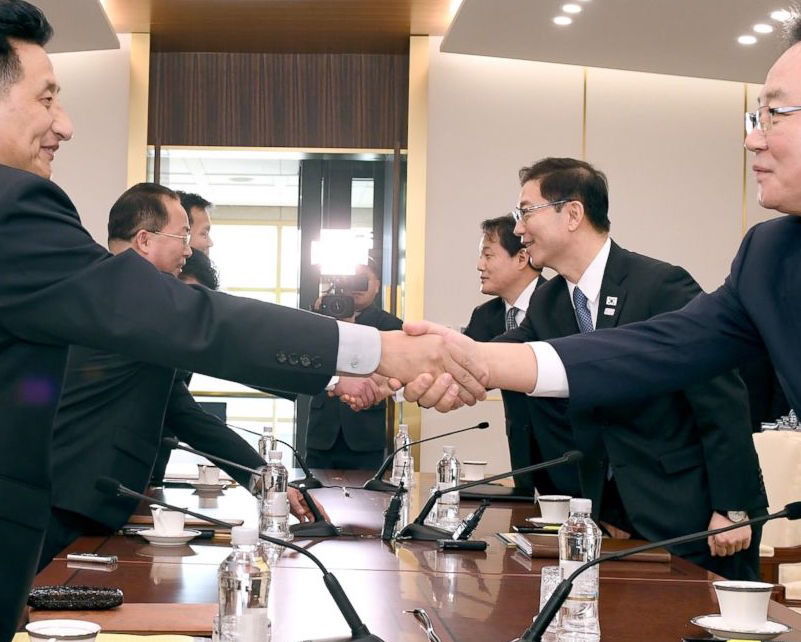On the morning of Jan. 9, North and South Korean officials met inside the border city of Panmunjom to engage in a series of highly anticipated talks. The two neighbors had not engaged in direct talks since December 2015, but pressing issues as of lately forced them to set aside their differences and attempt to understand one another through debate and discussion.
Among the topics discussed, North Korea’s nuclear program and participation in the Pyeongchang Olympics were at the forefront, being subject to the most amounts of scrutiny and debate. These conversations came as no surprise, as both countries had hinted at pursuing these topics of interest. However, some feared that talking about these delicate issues, albeit peacefully, would further worsen the two countries’ relationship.
“I did have a few expectations prior to the event,” said Paul Kim (10), MUN club member. “Because there were rumors about North and South Korea creating a unified ice hockey team, I was excited that it would become a reality through these talks. But for the most part, I wasn’t hopeful because I predicted that there wouldn’t be much progression regarding discussion on nuclear development.”
Just like the worries echoed by many, tension was felt when South Korean negotiators tried to bring up the issue of the North’s continued nuclear development. In the opening remarks and between discussions, South Korean officials such as deputy unification minister Chun Hae-sung tried to express hopes for denuclearization, but failed to convince their counterparts. They remained silent and unresponsive during these speeches, hinting once again at their inclination to ignore warnings issued by other countries.
“I think it is a positive sign that North Korea is sending a team to the Pyeongchang Olympics,” said Mr. Silber, Asian Studies teacher. “However, I think people need to be careful and separate this from discussion about denuclearization, which I don’t think is a reasonable expectation to have. Overall, I think that the talks are a good beginning, and North Korea is potentially interested in de-escalation.”
But contrary to initial fears, overall the talks did progress more smoothly than expected. Most importantly, North Korea agreed to attend the Olympics. This decision was a huge milestone in Korean history for several reasons. Not only was it North Korea’s first time attending the Winter Olympics in eight years, but it also marked a departure from the North’s former feelings towards an Olympics held in South Korea. The 1988 Olympics held in Seoul had been met with spite and bitterness by North Korea, and the regime even went as far as to plant a bomb on Korean Airlines Flight 858, resulting in the deaths of 115 passengers.
“Personally, I support the idea of North Korea attending the Olympics,” said Jenny Oh (10), a member of GIN. “I think the event is a great opportunity for our country to maintain friendlier relations with North Korea and move away from our differences, especially regarding conflict over the nuclear weapons.”
The discussions have once again confirmed that the only way for Koreans to mend this rift is to work together as a whole and not two separate entities. Although the path to friendly relations with North Korea will be rough, given the shared animosity and bitterness between the two countries, the global community, including both the aforementioned countries, as well as China, Japan, Russia, and the United States, has agreed that events like this conference will try to bring the countries closer slowly but steadily.

